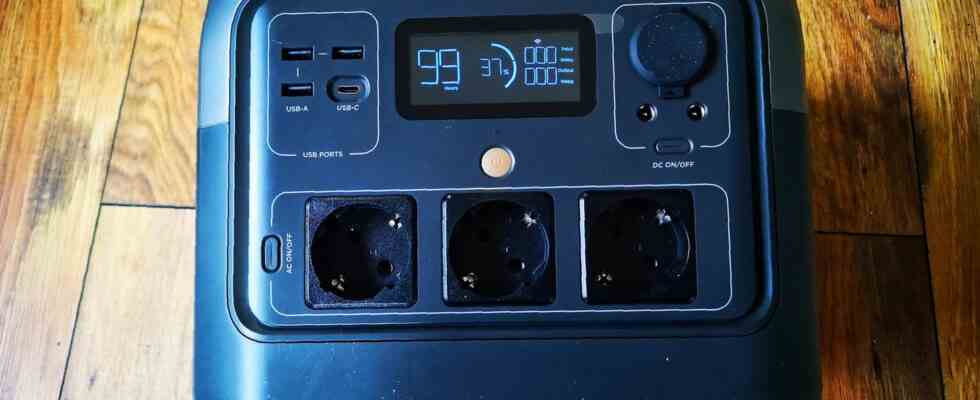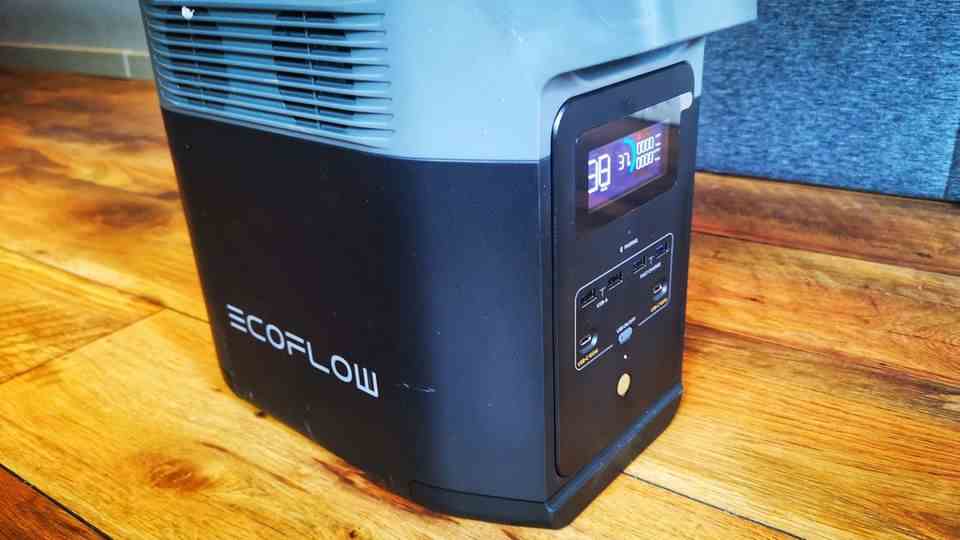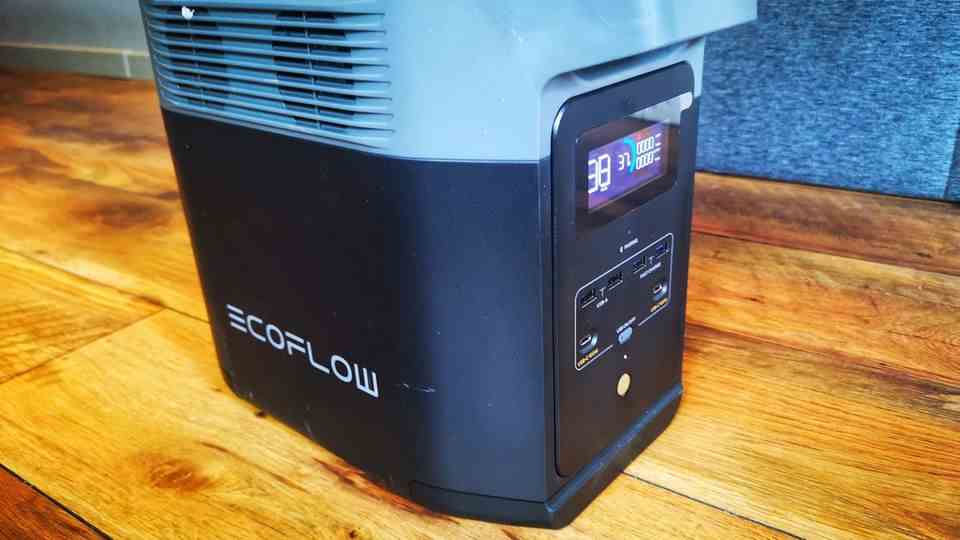practice test
power box
Ecoflow River 2 Pro – small power box with “eternal” battery life
Even the “big” Pro of the series remains clear. As usual, DC and AC can be switched on and off separately.
© star
The River 2 series is small and compact. The new version impresses with its five-year guarantee and batteries that are designed to last 3000 full cycles. In private use this can be translated as “for life”.
Ecoflow renews its range of “small” power boxes and launched the River 2 series in November. There are three devices: The river 2,river 2 max and River 2 Pro. Compared to the Delta 2 series, the boxes are significantly smaller, cheaper and have less capacity. The River 2 model achieves 256 watt hours, the Max 512 watt hours and the largest station in the series, the Pro, at least 768 watt hours. So the River 2 series ends where the Delta 2 series begins. We looked at the top model.
Small and light
These small devices are suitable for special applications. For example, if you want LED light, charge your smartphone and sometimes your laptop. Or even if a photographer wants to get a light drone ready to take off again. But they are not all-rounders that you can connect a hairdryer, hotplate or impact drill to, they are too weak on the chest. But they are light and portable. The models in the series weigh between 3.5 and 7.5 kilograms – an “all-rounder” with 2000 watt hours weighs over 20 kilograms. The devices remain in the same class as their predecessors, everything has become better in the details. If the customer registers, the devices now come with a five-year guarantee. That has a calming effect. TÜV Rheinland has tested the River 2 series, and its “Reliable Charger” award inspires confidence.
Ecoflow promises that the new LFP batteries should withstand 3,000 full charging cycles before the remaining capacity has dropped to 80 percent. If the box is completely emptied every working day, that’s ten years of operation. In private use, this can also be translated as “forever”. Also important for mobile use: The boxes fully charge in about an hour.
Safety through guarantee
We took a closer look at the largest box in the series, the River 2 Pro. Here you can most likely connect “normal” electricity consumers. The box has three 230 volt AC connections. They can deliver 800 watts of continuous power and 1600 watts in the short term in the so-called X-Boost mode. This box takes 70 minutes to charge. While the Delta models have the shape of a superscript, the Pro has a compact cube shape. The smaller models in the series are flatter. A carrying handle is integrated on the back. It does not stick out, the housing has been left out so that you can touch it. The box is compact and easy to carry. The weight of about eight kilos is not a particular challenge either. The case has rounded corners. The material is robust and yet feels comfortable. As with all Ecoflow devices, it comes in two anthracite tones, which makes the box look very elegant and would also fit into a stylish apartment. Unlike devices from manufacturers who rely on signal colors.
Also charging via solar, car socket and USB-C
In addition to the three 230 volt sockets, there are 3 USB-A and one USB-C port. The box can also be charged via USB-C. There are also DC direct current outputs – including the well-known 12.6 volt car plug. The electricity goes “in” via a 230 volt cable. The power pack is integrated in the box and does not have to be taken with you separately. We see it as an advantage not having to take a second device with us. However, the fast charging time and integrated power pack mean that the fan works noticeably when charging. In addition to the USB-C input, there is an Anderson port. Here you can charge with a supplied cable while driving from the car socket or connect a solar panel. The solar intake is limited to 220 watts. Ecoflow’s own panels are compatible – but so are those from numerous other manufacturers. Ecoflow’s 220W bifacial solar panel costs 549 euros. That’s fine for a branded panel, but it’s also cheaper. With 200 watts of solar power, you can definitely spend a self-sufficient camping holiday with the Pro. When the sun is shining, you should be able to fully charge the box twice a day.
Powerful but optional app
As expected, all features worked without complaint in the practical test. This is not to be expected otherwise with branded devices. In addition to the basic functions, the small River 2 has a special feature: as an intermediate device, it can compensate for failures in the network. This means that in normal operation it only allows the current from the grid to flow through. But if it fails, the box compensates for it within 30 milliseconds with its own battery power. This feature is interesting in countries where the power grid has frequent hiccups. So far this has been rather rare in Germany, but that could change. Given the capacity of the box, one cannot expect to be able to feed a heavier power consumer over long blackout periods. If you are planning something like this or even want to supply life-sustaining devices, you will not get anywhere with a box in the format of a shoebox. For him, Ecoflow offers the Delta Pro on, it stores 3600 watt hours – but is significantly heavier and more expensive.
There are no typical camping features such as a built-in lamp or contactless charging in the series. Ecoflow offers a very powerful app for this. You can use it, but you don’t have to. The box also works without having to install the app even once. Extensive settings can be made with the app. It is also practical that the box can be switched off remotely. Because even in stand-by mode, an activated 230-volt inverter sucks the power from the battery.
Our conclusion
The River 2 series is a logical further development of its predecessors. The smaller models in particular are intended for specific applications, they do not simply replace a socket. Even the “big” Pro is not a “one size fits all” model, although it can feed many 230 volt devices. If the dimensions are right, the box will impress with its features and the 5-year guarantee at no extra charge. The promised stability of the batteries is an important point. Ultimately, the long life expectancy makes such boxes much cheaper than short-lived models.
In view of the successors, the predecessors can be obtained more cheaply. But the difference to the second series is so huge that we would always prefer the River-2 at the regular price to a River-1 with a discount. The River 2 Pro costs 799 euros if you can get it. This is significantly cheaper than the slightly stronger delta 2. It has more power and more features, but also costs 1199 euros. The smallest River 2 costs only 299 euros – it can also be enough for camping fun if you don’t use any or hardly any 230 volt alternating current and recharge with a solar panel.
Although power boxes are currently being snatched from the hands of the manufacturers, there are occasional discount campaigns. Especially bundles with a solar panel are then offered cheaper.
This article contains so-called affiliate links. There is more information here.




